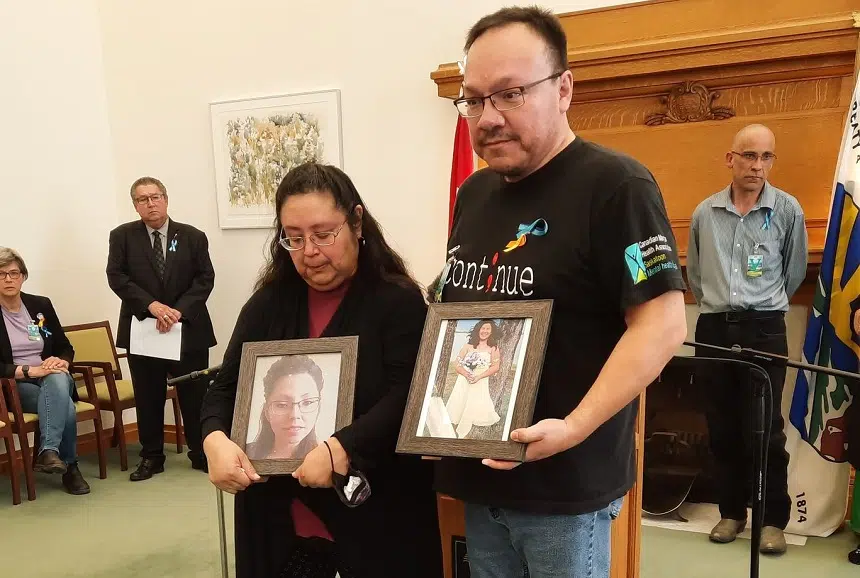Jude Ratt was disappointed and angry after watching the Saskatchewan government decline to strike a bipartisan special committee of the Legislature with the NDP on the mental health crisis and addictions crisis.
On Tuesday, NDP MLA Doyle Vermette tried to introduce a motion to create the committee but the Saskatchewan Party didn’t give him leave.
Ratt and his wife were watching from the gallery and afterward, he said his wife was so hurt and broken over it that she didn’t want to come out and speak to media about it.
Ratt said he was lost for words on how he felt about it. He said the government obviously didn’t understand anything his family is going through.
“They obviously don’t realize the gravity of the validation they could give us, families that have lost loved ones. That validation is very important. Of course it’s going to give us a reason to keep going,” said Ratt.
Ratt’s teenage niece, Ariana, died by suicide a few years ago and the same happened to his daughter Betty in December. Betty left behind four children.
“A few days later, on my wife’s birthday, she had to bury her only child,” said Ratt, his voice wavering.
Ratt called it heartbreaking.
“Even now, my chest hurts physically. My heart hurts from my loss,” said Ratt. “Some days, it’s hard to sleep some nights. Taking care of ourselves physically, on a daily basis, becomes a real chore. Sometimes it’s hard to get out of bed. We have to deal with our own depression that’s brought on by this loss.”
Ratt said they tried to get both the women help but there wasn’t any to be found.
“Even to this day, I have a friend who went to go to the health centre to try to get help for his depression. He was having suicidal thoughts (and) they made him an appointment two weeks later . That’s not acceptable,” said Ratt.
Marilyn Irwin said the same – she lost her son in May 2018 to suicide. She said she has seen the gaps in help in Saskatchewan firsthand in trying to get help for her son.
“We got no help. I’m still asking for help for other people that I see this government and this province is failing,” said Irwin.
After the government denied the committee, Irwin said she wasn’t shocked.
“I came in here feeling very bitter but Doyle was hopeful – and that was one of the reasons I came, otherwise I wouldn’t have come, because I don’t have faith in this government and I haven’t for a long time,” said Irwin.
Wanda and Chris Ball also watched from above, holding pictures of their son Kai – he was 16 years old when he died by suicide in 2017.
“We spent a lot of time in the health system fighting to get him help and our system failed him,” said Wanda.
Chris said they were on wait lists for a psychiatrist for their son and were even denied emergency help at the hospital when they went in to get stitches in his arm.
“There are so many gaps and as parents we shouldn’t have had to fight as hard as we did to try to save our son,” Chris said.
Wanda and Chris said they want the bipartisan committee formed to try to get things changed so others won’t have to go through what they did.
“(The government) just throw Mickey Mouse amounts of money at it and they think they’re done … They’re doing very minimal to it and we’re back again to say, ‘No, minimum’s not enough.’ There’s no way minimum support’s enough,” said Chris.
After the committee was rejected, Chris and Wanda said they felt ignored. Chris said he doesn’t think the MLAs want to know the real truth about this situation; he believes government just wants to pretend it’s doing something.
Ahead of making the request in the house, Vermette was hopeful. He said he’d heard in debate that government members want to work on this issue.
“Here’s the minister’s opportunity, the government’s opportunity to work with us as Opposition but with the families, with the experts that are out there, with stakeholders – our leaders, First Nations, Metis leaders – there’s an opportunity we can work together,” said Vermette.
Tuesday was the 21st day of the spring sitting that Vermette stood up in Question Period to ask about the province’s actions on suicide prevention.
“It’s not easy to do, I’ll be honest. It’s not easy but I don’t want to give up. There’s hope,” said Vermette.
Vermette doesn’t want to give up because every time he meets families who’ve lost someone, they tell him not to give up.
In explaining the government’s decisions, Minister of Mental Health and Addictions Everett Hindley said there were already committees doing that work, including under its Pillars for Life suicide prevention plan.
“It is experts in this field, those that are directly involved in the programs and initiatives that are currently operational, and underway and available in this province but that’s also an avenue for people to be able to provide some advice and insight as to where there’s perhaps some gaps, or they’d like to see some additional support from the Government of Saskatchewan,” said Hindley.
Ratt said he hasn’t seen any changes in his area and hasn’t seen any improvements coming out of Pillars for Life.
While Hindley admits there is still work to be done, he believes that important steps have been taken, pointing to a pilot project to build mental health capacity in schools as an example.
Hindley also said people who want to talk can reach out to their MLAs.
Meanwhile, Irwin and the Balls said they had tried to talk to their MLAs but got no response.
The Ratts’ MLA is Vermette.







